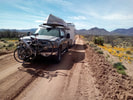|
In a recent post, Charlie told the story of the day when Camilla disappeared under the bush in the front yard. This event has prompted me, Sue, to give some advise on what we have found to be the best way to track our pets should they magically 'disappear' under a bush, an RV, a bridge. You know what I mean. Cats especially have a mind of their own when it comes to them wanting to run free for a while.
The problem is, they don't realize that there are numerous drawbacks to being 'free', such as other cats and dogs who could be very territorial. Also, there are notorious stories of how many cats have been taken by hungry coyotes and foxes. Never mind eagles and even owls that might see your pet as a tasty morsel. Some years ago, we discovered that a very good way of tracking down an outdoor cat that was always running loose, was to attach a cat locator that, at that time, we had imported from Europe, due to the limited availability of the exact type of locator that we needed. What we learned was that it was best to purchase a RADIO locator, bearing in mind how cats manage to find the most awkward places to hide out in, making a GPS sometimes unreliable. We have numerous stories to tell of how our cat managed to head into a forested area and disappear until we were able to figure out that she had not gone very far at all, but she was a very adept escapee, who knew to lay low when trying to keep out of our line of sight. So, it was with great joy when, after receiving the locator and she made her first escape, we started up the home device and it immediately started to beep and in fact, we also heard a second beep in the near bushes, which indicated that she was mere feet away from us. The second beep came from the unit attached to her neck which not only beeps, but it also flashes, so if she disappeared at night, we could always track her down just with the flashing light. The nice thing about our device is that it pointed in the direction that the cat is in and also, how many feet away she was. The only drawback we found is that she sometimes ran out of the 100 foot range of the locator, so it was only when we carefully walked in the direction we thought she might be in that we could then home in on her. When making our decision to purchase the Loc8tor, the most important factor we learned is that it is more reliable to have a radio controlled device than a GPS controlled device primarily because of the nature of cats, who are known to find the most out of the way spots to hide out for the day. So, the moral of this story is that after our last escapee experience with Camilla, who is an indoor cat, but goes out with us on her harness, we will now attach the original locator to her collar just in case she managed to pull another break-away stunt. We figure that now that we are getting a little older, we really don't want to be hassled with heading into the type of foliage that we used to encounter when chasing after our first cat. The added benefit of having a pet locator is that ours came with two collar units and we ordered two extra units, so if we chose to, we could attach any of the units to our keys or wallets to help us find these devices that could get lost when on the road.
0 Comments
|
Authors: Charlie and CamillaWe are both young cats who were taken from an animal shelter in Florida. We traveled with our new owners up north to Nova Scotia, where we get to live in a nice big house with loads of room to run around in. When we are not in the house, we are back on the road, traveling long distances, across the country. We consider ourselves to be very well traveled pussy cats, who are fully adaptable to whatever our new surroundings present. By the way, we have been told to stress to our readers that we are NEVER allowed to go for walkies on our own. Apparently there are all kinds of 'dangers' out there (whatever that is?), so we always have our snazzy harnesses on. In fact, we don't like it if we are ever left to roam on our own without the 'leash' attached to us. Archives
October 2016
Categories |

